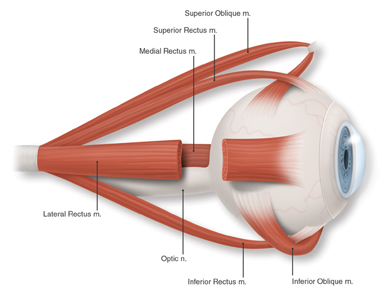Today, many surgeries of the eye can be performed using techniques that allow your ophthalmologist (Eye M.D.) to use injectable anesthetics to completely numb your eye before your surgical procedure rather than putting you to sleep using general anesthesia.
Retrobulbar anesthesia is the injection of a local anesthesia behind the eye that completely numbs the eye. First, your ophthalmologist applies a topical anesthetic to numb the injection site on your lower eyelid. Then, the ophthalmologist inserts a needle under your eyeball and injects a local anesthetic behind your eye. This completely numbs your eye so that you will feel no pain during surgery. It also immobilizes your eye so that your ophthalmologist can perform your surgery quickly and easily.
This illustrates the eyeball and the extraocular muscles that insert into it. The goal with retrobulbar anesthesia is to aim the tip of the needle behind the eyeball, into the space between the muscles (the ‘cone.’)

By using retrobulbar anesthesia, your ophthalmologist ensures that you are as comfortable as possible during and following surgery. Since you will not be put to sleep using general anesthesia, your recovery time after surgery will be much quicker, and you will be able to go home the same day. Because this anesthetic affects your optic nerve, you will not be able to see out of your eye during surgery. It is possible that following surgery you will experience a brief period of vision loss due to the anesthetic. This is temporary, and your vision will quickly return.
Though very safe, there are some risks associated with retrobulbar anesthesia, as there are with most medical procedures. These risks are due to the anesthetic, as well as to the injection procedure itself. These risks include hemorrhage in the eye socket, perforation of the eyeball, and damage to the optic nerve. This is why the preferred method of anesthesia when possible is to perform either topical or peribulbar anesthesia. Should you experience any complications due to this procedure, it is possible that your doctor will have to cancel and reschedule your surgery.
(c) 2009 Robert M Schertzer, MD, MEd, FRCSC based on 2007 The American Academy of Ophthalmology
